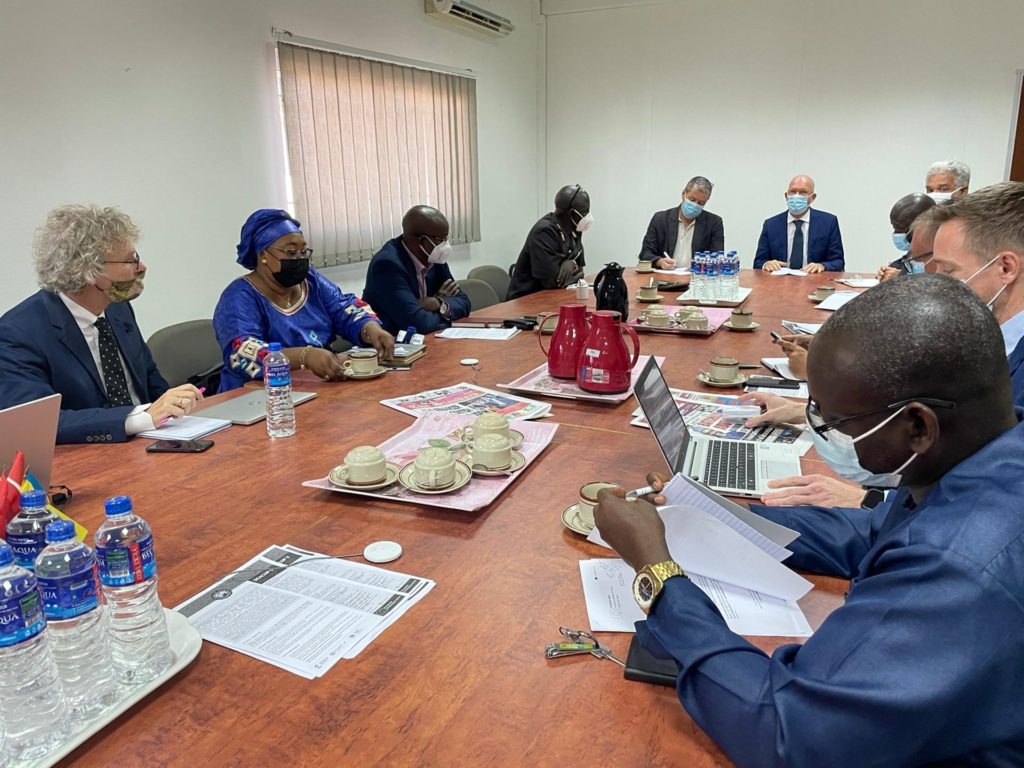
On Wednesday 9th February, 2021, The European Union Delegation to The Gambia hosted a workshop aimed at presenting the opportunities of support that a number of EU regional interventions offer in order to improve maritime security and the fight against transnational organised crime in the West-African region and in The Gambia in particular. This was a coordination effort built on the occasion of the simultaneous mission of three EU-funded projects in The Gambia.
On a relatively short notice, the workshop gathered the participation of some 30 stakeholders, ranging from officials of the Ministry of Interior, the Ministry of Fisheries, the Gambian Maritime Administration, the Gambian Port Authority, the Gambian Immigration Department, the Gambian Navy, the Office of the National Security Adviser, the International Organisation on Migration and DCAF. In addition, the whole “Team Europe” in The Gambia (the EU and France, Germany and Spain) were represented, as a testimony of our engagement with The Gambia on Maritime Security.
EU Ambassador to The Gambia, HE Corrado Pampaloni, opened the meeting. The EU Senior Coordinator for Maritime Security in the Gulf of Guinea at the European External Action Service, Mr Nicolás Berlanga, then set the scene and four EU-funded regional projects related to Maritime Security and Transnational Organised Crime were presented : SWAIMS, SEACOP, GoGIN+ and OCWAR-T *
“For a coastal country like The Gambia, Maritime Security is of critical importance. As we all know, The Gambia is indeed plagued by a number of threats, from illegal, unreported, and unregulated (IUU) fishing to drugs and counterfeited medicines or timber trafficking and to trafficking in human being and smuggling of migrants. All of them are of a transnational nature and use the fluvial and maritime routes. The Gambian authorities are working hard on facing these threats and have registered a number of successes, namely in terms of drugs seizure. However, the fight against transnational crime along maritime routes is a common responsibility for which the EU is willing to bear its part of the burden. This is why we have fielded these three exploratory missions at the same time in The Gambia. They are now entering into deeper discussions with the Gambian partners,” EU Ambassador Pampaloni said.
The support that those projects can offer range from information and data sharing, secured IT equipment, patrol and interception light boats, trainings, joint operations, etc.
The SEACOP V project aims to contribute to the fight against maritime illicit trade and associated criminal networks in the targeted countries in order to alleviate its negative impact on security, public health and socio-economic development. The objective will be to assess the possibility to carry out the phase V of the SEACOP project in The Gambia.
The SWAIMS project aims to improve maritime security and safety in the Gulf of Guinea. The project has two main axes: (i) strengthening legal, governance and law-enforcement frameworks to better support maritime security; and, (ii) improving law-enforcement operational capacities through customised institutional and technical capacity-building, particularly to assure legal finish. The objective will be to get points of contact to assist with the delivery of equipment to be provided under the project, understand the perception of imminent maritime security threats and to identify areas for possible cooperation where SWAIMS can lend support in future.
The GoGIN+ project aims at completing the deployment of the YARIS network. YARIS is an information sharing platform, integrating several sources of information, aiming to facilitate and enhance the operational cooperation of stakeholders involved in the maritime security in the Gulf of Guinea. At this stage, the YARIS network links the maritime security centres belonging to the Yaoundé Architecture, and some of their international partners. The next step is the development of YARIS national networks in the coastal states of the Gulf of Guinea. The Gambia network is expected to be in use in July 2022, just after a specific training implemented by GoGIN+.
The Organised Crime: West African Response to Trafficking (OCWAR-T) project supports ECOWAS Member States and Mauritania in reducing transnational organised crime (TOC). To this end, the project strengthens national and regional structures and capacities and fosters evidence-led policy and decision-making. Specifically, OCWAR-T supports efforts in enhancing criminal investigation and prosecution, improving small arms control and reducing human trafficking.
Source: The European Union Delegation to The Gambia
